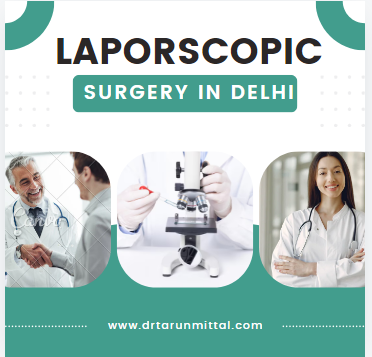
In recent years, laparoscopic surgery has emerged as a breakthrough in the medical field, transforming the way surgeons operate and patients recover. Also known as minimally invasive surgery, this technique has gained immense popularity for its precision, shorter recovery times, and reduced post-operative complications. In cities like Delhi, where cutting-edge medical technologies are widely available, laparoscopic surgery is rapidly becoming the preferred choice for both surgeons and patients alike. This article delves into the intricacies of laparoscopic surgery, its advantages, common procedures, and why Laparoscopic Surgery in Delhi is at the forefront of medical advancements.
What is Laparoscopic Surgery?
Laparoscopic surgery is a minimally invasive surgical technique that allows surgeons to operate through small incisions rather than traditional open surgery. The procedure is performed with the aid of a laparoscope, a thin tube with a camera and light attached, which provides real-time images of the internal organs on a monitor. This allows the surgeon to perform complex surgeries with high precision without needing to make large incisions.
The primary tools in laparoscopic surgery include:
- Laparoscope: A long, flexible tube with a camera that transmits images to a video monitor.
- Trocars: Small tubes through which surgical instruments are inserted.
- Graspers and scissors: Specialized instruments used for cutting and holding tissues during surgery.
Common Laparoscopic Procedures
Laparoscopic surgery is used in a wide range of medical fields, including gynecology, urology, gastroenterology, and bariatrics. Some of the most common laparoscopic procedures include:
- Laparoscopic Cholecystectomy (Gallbladder Removal): This is one of the most frequently performed laparoscopic surgeries. It involves the removal of the gallbladder due to gallstones or other complications.
- Laparoscopic Appendectomy: Removal of the appendix due to appendicitis is another common procedure. Laparoscopic appendectomy allows for quicker recovery compared to open surgery.
- Laparoscopic Hernia Repair: Surgeons can repair hernias through small incisions using mesh to strengthen the weakened area, with minimal discomfort to the patient.
- Laparoscopic Hysterectomy: In gynecological cases, this technique is used to remove the uterus with minimal tissue damage and scarring.
- Laparoscopic Bariatric Surgery: Weight-loss surgeries, such as gastric bypass and sleeve gastrectomy, are increasingly performed using laparoscopic techniques, reducing the risks associated with traditional open surgery.
- Laparoscopic Nephrectomy (Kidney Removal): For patients with kidney disease or tumors, laparoscopic surgery provides a less invasive option for kidney removal.
Advantages of Laparoscopic Surgery
Laparoscopic surgery offers several benefits over traditional open surgery, making it an appealing option for patients and doctors alike. Some of these advantages include:
1. Smaller Incisions
One of the most significant benefits of laparoscopic surgery is the smaller incisions required. In traditional open surgery, large incisions are made to access the organs. In contrast, laparoscopic surgery requires only small cuts, usually between 0.5 to 1.5 cm, which reduces tissue damage and scarring.
2. Faster Recovery
Since laparoscopic surgery is minimally invasive, patients often experience shorter recovery times. Most patients can resume their normal activities within a few days or weeks, depending on the procedure. This is especially important for those who need to return to their daily routines quickly, such as professionals and parents.
3. Less Pain
Smaller incisions result in less post-operative pain, reducing the need for strong pain medications. Patients undergoing laparoscopic surgery often report less discomfort and a quicker return to their daily lives.
4. Reduced Risk of Infection
Minimally invasive procedures significantly lower the risk of post-operative infections. The smaller incisions limit the exposure of internal organs to external contaminants, reducing the chance of infection.
5. Improved Surgical Precision
The use of a camera during laparoscopic surgery allows surgeons to have a clear, magnified view of the operating area. This improves precision and reduces the likelihood of damaging surrounding tissues or organs.
6. Shorter Hospital Stays
With quicker recovery times and fewer complications, patients typically spend less time in the hospital after laparoscopic surgery. Some procedures may even be performed on an outpatient basis, allowing patients to go home the same day.
Laparoscopic Surgery in Delhi: The Cutting Edge
Delhi is home to some of India’s leading hospitals and surgeons specializing in laparoscopic procedures. With advancements in medical technology, Delhi’s healthcare system has become a hub for both local and international patients seeking high-quality, minimally invasive surgeries.
Several factors make Laparoscopic Surgery in Delhi stand out:
1. World-Class Hospitals
Delhi boasts numerous world-renowned hospitals, such as Apollo Hospital, Fortis Healthcare, and Medanta, that offer state-of-the-art facilities for laparoscopic surgery. These hospitals are equipped with the latest technology, ensuring that patients receive the best care possible.
2. Expert Surgeons
The city is home to some of the best laparoscopic surgeons in India. These specialists are not only highly trained but also have extensive experience in performing complex laparoscopic procedures. Surgeons in Delhi are often at the forefront of medical research, contributing to the global advancement of laparoscopic techniques.
3. Affordable Healthcare
One of the reasons Laparoscopic Surgery in central Delhi attracts international patients is the affordability of medical care. While the quality of healthcare in Delhi is comparable to international standards, the cost of surgery is often significantly lower than in Western countries. This makes Delhi a popular destination for medical tourism.
4. Comprehensive Post-Operative Care
Post-surgery care is a critical aspect of recovery. Hospitals in Delhi provide excellent post-operative services, including follow-up consultations, physiotherapy, and dietary guidance to ensure that patients recover fully and return to their normal lives as quickly as possible.
Who Can Opt for Laparoscopic Surgery?
Not all patients are candidates for laparoscopic surgery. Factors such as the patient’s overall health, the nature of the disease, and the complexity of the surgery can determine whether a laparoscopic approach is feasible. In some cases, open surgery may still be necessary, particularly if there is extensive tissue damage or the surgery requires large-scale organ manipulation.
However, for most patients requiring surgeries like gallbladder removal, hernia repair, or appendectomy, laparoscopic surgery is an excellent option. Patients should consult with experienced surgeons in Delhi to assess whether they are suitable candidates for this minimally invasive technique.
Conclusion
Laparoscopic surgery is revolutionizing the field of medicine with its minimally invasive approach, offering patients a safer, quicker, and less painful alternative to traditional open surgery. With top-notch hospitals, skilled surgeons, and cutting-edge technology, Laparoscopic Surgery in Delhi is at the forefront of this medical advancement. Whether it’s for a routine procedure or a more complex operation, patients can be assured of world-class care and better recovery outcomes.
For anyone considering surgery, it’s essential to explore laparoscopic options, especially in a city like Delhi, where medical innovation is thriving. The future of surgery is here, and it’s minimally invasive.
Click here for more information our official website :Dr Traun Mittal







